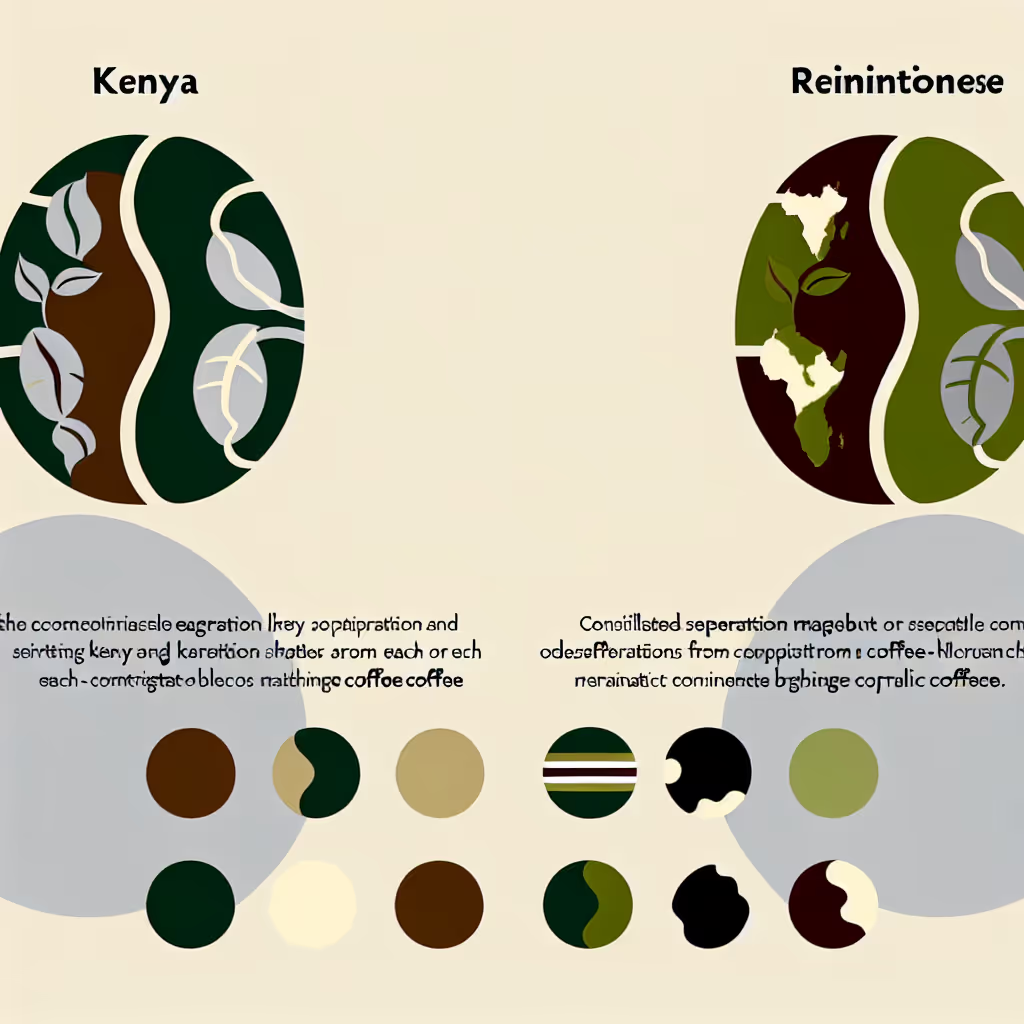Kenyan Vs. Cameroonian Coffee
This comparison explores the distinct qualities of Kenyan and Cameroonian coffees, examining their flavor profiles, growing conditions, and brewing methods to help coffee enthusiasts make informed choices.

Brief Description
Kenyan coffee is renowned for its bright acidity, full body, and complex flavor profile. Grown in the rich volcanic soils of the Central Highlands, these beans benefit from ideal climate conditions and meticulous processing. The result is a cup that's bold, wine-like, and often described as the 'connoisseur's choice'. With notes ranging from blackcurrant to citrus, Kenyan coffee offers a truly unique and memorable tasting experience.
Cameroonian coffee is a hidden gem in the African coffee scene, known for its rich, full-bodied flavor and unique character. Grown in the lush highlands of the West and Northwest regions, these beans benefit from the area's volcanic soils and ideal climate. Cameroonian coffee often exhibits a delightful balance of earthy notes and subtle fruitiness, making it a favorite among those who appreciate a bold yet nuanced cup.
Importance of Comparison
Comparing Kenyan and Cameroonian coffee is crucial for coffee lovers seeking to explore the diverse flavors of African coffees. These two origins offer unique taste experiences, reflecting their distinct terroirs and processing methods. Understanding their differences helps consumers expand their palate, make informed purchasing decisions, and appreciate the rich coffee heritage of Africa.
Key Attributes
Origin
Kenyan
Cameroonian


Consumer Guide
When choosing between Kenyan and Cameroonian coffee, consider your flavor preferences. If you enjoy bright, wine-like acidity with complex fruit notes, Kenyan coffee is an excellent choice. Opt for pour-over or French press brewing to highlight its unique characteristics. For those who prefer a full-bodied, earthy cup with subtle fruitiness, Cameroonian coffee is ideal, especially when brewed as espresso or French press. Consider the altitude and processing methods: Kenyan coffee, grown at higher elevations (1400-2100m), often undergoes double fermentation, resulting in a cleaner taste. Cameroonian coffee (1000-1800m) offers more processing variety, including natural methods that can add depth to the flavor profile. Lastly, consider availability; Kenyan coffee has higher annual production and may be more readily accessible.
Expert Opinions
Coffee expert Maria Rodriguez notes, 'Kenyan coffee is often considered the pinnacle of African coffees, with its vibrant acidity and complex flavor profile. However, Cameroonian coffee is gaining recognition for its unique balance of earthiness and subtle fruit notes.' Roaster John Smith adds, 'While Kenyan coffee shines in lighter roasts, Cameroonian beans often benefit from medium to dark roasts, bringing out their rich, full-bodied character. Both origins offer exceptional quality, but appeal to different palate preferences.'
FAQs
Kenyan coffee is known for its bright acidity, full body, and complex flavor profile with notes of blackcurrant, citrus, and floral undertones. Cameroonian coffee, on the other hand, offers a rich, full-bodied flavor with earthy and nutty notes, complemented by subtle fruit flavors. The difference in taste is largely due to variations in growing conditions, altitude, and processing methods.
For Kenyan coffee, pour-over, French press, and cold brew methods are recommended to highlight its bright acidity and complex flavors. Cameroonian coffee excels when brewed using French press, espresso, or cold brew methods, which emphasize its full body and rich character. Experimenting with different brewing techniques can help you find the perfect method to bring out the unique qualities of each origin.
Kenyan coffee is typically grown at higher altitudes (1400-2100m) in volcanic soils, contributing to its bright acidity and complex flavor profile. Cameroonian coffee is grown at slightly lower elevations (1000-1800m) in the country's western highlands, resulting in a more balanced, full-bodied cup with earthy notes. The different microclimates and soil compositions in these regions play a significant role in shaping the distinct flavors of each origin.
Kenyan coffee is primarily processed using the washed method, often with a unique double fermentation process that contributes to its clean, bright flavor profile. It's then typically sun-dried. Cameroonian coffee offers more variety in processing, including washed, natural, and semi-washed methods. This diversity in processing allows for a wider range of flavor profiles in Cameroonian coffee, from clean and bright to more complex and fruit-forward.
Kenyan coffee tends to be more widely available due to its higher annual production of around 50,000 metric tons, compared to Cameroon's 34,000 metric tons. This higher production, combined with Kenya's established reputation in the specialty coffee market, makes Kenyan coffee more accessible to consumers worldwide. However, Cameroonian coffee is gaining recognition and may become increasingly available as interest in diverse African coffee origins grows.
Conclusion
Both Kenyan and Cameroonian coffees offer unique and rewarding experiences for coffee enthusiasts. Kenyan coffee stands out with its bright acidity, complex flavor profile, and wine-like qualities, making it a favorite among those who appreciate a bold, distinctive cup. Cameroonian coffee, with its rich, full-bodied character and subtle fruitiness, provides a more balanced and nuanced option. Your choice between these two exceptional African origins ultimately depends on your personal taste preferences, desired brewing method, and the specific flavor journey you're seeking. Whichever you choose, both origins promise to deliver a high-quality, memorable coffee experience that showcases the best of African coffee production.






